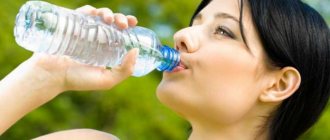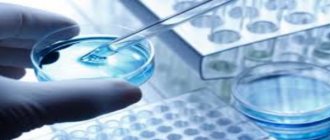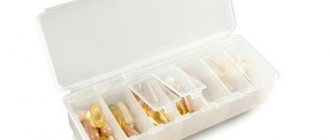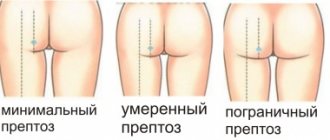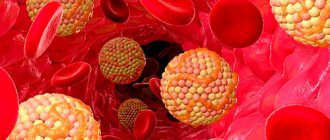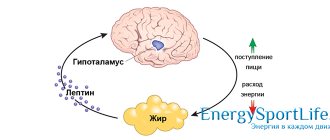Content
- 1 Water in the human body 1.1 Maintaining water balance in athletes
- 1.2 Optimal water temperature
- 5.1 Temperature control
- 6.1 Water and kidney stones
Water and muscle growth
Many experts recommend that gym goers drink plenty of water. This is correct advice. Firstly, water, like air, is necessary for physical work itself - to obtain ATP (the source of energy for any physical human action and processes in it). Just look at the formula for ATP formation.
Secondly, only in the absence of water deficiency are processes of hypertrophy of muscle proteins possible. Actually, all energy processes in the body occur in an aquatic environment.
Thirdly, if enough water enters the body, it is able to linger in the intercellular space of muscle tissue, as well as in the cells themselves (for example, in sarcoplasm), which as a result leads to an increase in muscle volume (by the way, this process is actively observed during taking anabolic steroids).
In dry people (this is the word we use in this article to call ectomorphs), water is poorly retained in the body. Obviously, this is due to the fact that their overall metabolism is high (fast).
What happens in the human body during the “drying” process? First of all, metabolism increases. Accordingly, if you have an increased metabolism, then we can say that you are in the process of constant “drying”. As you know, you can’t dry out and gain weight at the same time. These are two opposite processes. That is why dry people are people not only with a low percentage of fat, but also with insufficient muscle mass.
So, the intermediate conclusion is formulated as follows: fast metabolism leads to insufficient amount of water in the body for normal muscle growth.
It cannot be said that rapid metabolism is accompanied by dehydration of the body and has negative consequences in the form of various diseases. No, it's not that sad. There is enough water for a lot of things, for everything except weight gain. By the way, one of the notable “symptoms” of rapid water exchange in the body (and high metabolism in general) is a thin face (“no cheeks”). Bodybuilders, well-dried, (especially in the categories below 90 kg) on the face look no better than victims of Auschwitz.
Water in the human body[edit | edit code]
Yuzhakov Anton Voda. Types of water. Water consumption standards
Water consumption and excretion Estimated water requirement depending on exercise intensity and body weight
Documentary about water
We are made up of about 60% water, and our muscles are 75-80%. Water plays an important role in all life processes: from maintaining constant body temperature and pressure to muscle growth. Glycogen, the main source of energy during training, consists of 3/4 water. A lack of water in your diet dramatically reduces the absorption of proteins and carbohydrates, which directly inhibits your muscle growth.
Maintaining water balance in athletes[edit | edit code]
Rehydration directly during prolonged muscle activity. Since water is found in most tissues of the human body, replacing its reserves plays a vital role in all processes and functions of the body during training and competition. According to modern concepts, fluid intake during and before training, during, after, and during competition is a necessary condition for high athletic performance.
The amount of daily water consumed normally fluctuates depending on various factors: a person’s weight, lifestyle, type of training, diet, etc. During physical activity, the body loses fluid through the skin in the form of sweat and water vapor in the exhaled air. The amount of fluid lost depends on the ambient temperature, humidity and altitude and varies in the range of 0.5-1.2 liters. In extreme environmental conditions, fluid losses can be up to 2 liters per hour or more. When dehydration exceeds 2% of body weight, a marked decline in physical performance may occur.
Some recommend this method of assessing the degree of hydration of the body[1][2][3] - observing the amount and color of the athlete’s urine. Urination should supposedly be frequent throughout the day, and the color of the urine should be light. If the urine is dark and very yellow, you need to drink plenty of fluids. An effective method is also to measure body weight before and after training. For every 100 g of weight loss (through sweat), you need to replace 150 g of fluid. However, opponents of this method point out that urine can be colored for other reasons - due to the consumption of foods rich in carotene or vitamin B2 preparations. Some diseases also affect the color of urine. Therefore, this method of assessing hydration cannot be considered completely reliable.
Water, writes M.V. Mellion (2002), taken the day before a long or intense workout, is a major contributor to increased performance. Therefore, the athlete should drink as much fluid as possible and eat plenty of carbohydrate-rich foods with a high water content (fruits and vegetables). Each gram of carbohydrates stored in the body corresponds to 3-4 g of water, easily available for basic processes.
To ensure a sufficient amount of fluid in the body, it is advisable to drink about 400-500 ml of water 2 hours before the competition. Since the body takes approximately 1-2 hours to “absorb” the fluid, the athlete will have time to empty their bladder before the event.
During physical activity lasting more than 60 minutes, 100-150 ml of cool water every 15-20 minutes will ensure optimal hydration.[4][5] In the same amount (to replenish fluid reserves and muscle glycogen), you need to drink carbohydrate-electrolyte drinks containing 5-8% carbohydrates: Since the body has an inadequate mechanism for the manifestation of thirst, it is recommended to take liquid before thirst is felt. As soon as the desire to drink arises, there is already a slight degree of dehydration and performance decreases.
Optimal water temperature[edit | edit code]
According to A. Pshendin[6], the water temperature should be 8-13°C. It is this temperature, the author believes, that is optimal due to the available data on the positive effect of cooling the oral cavity on thermoregulation processes, which helps maintain the physical performance of athletes. A. Costill (1974) recommends drinking cold water at a temperature of 5°C, since a number of studies have established that during physical exercise the rate of fluid absorption increases in proportion to the decrease in its temperature.
Basic rules for drinking water
The most important thing for a bodybuilder is to stop drinking regular tap water.
It is necessary to drink only purified water, which should always be with you. You should not be afraid of ridicule from the outside about this. To questions from the curious, you can answer that this is the doctor’s order. Almost always, after such an answer, no more questions arise. Also remember that during a training session you should drink 100 to 150 grams every twenty minutes. This dosage should not be exceeded, but less than 90 grams of water should also not be consumed. Before starting the training, about two hours before it starts, you should drink at least 0.5 liters of water.
You should never limit yourself in water. If you're thirsty, then do it. It is possible that you will not always have the opportunity to use filtered water, but you should try to increase its percentage in the total volume of liquid consumed.
It is advisable to drink chilled water, as it is better absorbed by the body. Also, you should not increase the amount of water you drink artificially. Only during training should fluid intake be mandatory, and the rest of the time, always be guided by your sense of thirst. An excess of fluid in the body is just as dangerous as a lack. The body itself will tell you when it needs to replenish its water supply.
You will learn more about the importance of water in bodybuilding from this video:
Rules for drinking water in bodybuilding and fitness[edit | edit code]
- Since you must drink a lot of clean water during the day, it is advisable to carry it with you in bottles, as professionals do. To do this, it must be constantly nearby, no matter where you are - in the office, gym or while driving a car.
- Drink water in small portions of approximately 100 g every 10-20 minutes during training, and also take small portions after training until your thirst is completely quenched.
- During the day, drink when and as much as you want, while being guided by your own thirst. Do not artificially increase your drinking ration, except during training. Excess water is just as negative as its lack. It is clear that in summer, due to the heat, more water is taken than in the cold season.
- Also try to cook food using clean filtered water.
- Drink water at room temperature or slightly chilled. During the cold season, you can drink warm and even hot water.
- Taking nutritional supplements (protein powder, gainer, creatine, etc.) increases the body's water consumption.
- To find out the maximum amount of water you need per day, it is sometimes recommended to use the formula: divide your weight by 2, and put a comma between the resulting numbers. According to this theory, if you weigh 90 kg, you can consume 4.5 liters per day. (90:2 = 45 = 4.5). Proponents of this method cite the fact that at one time “Mr. Olympia" Dorian Yates allegedly consumed 10 liters of water per day with his own weight of 130 kg (!). They also suggest calculating the minimum amount of water when doing bodybuilding - divide your own weight (in kg) by 30. That is, with a weight of 90 kg, the minimum will be 3 liters (90:30 = 3). The validity of these formulas has not been confirmed experimentally. At the same time, the semi-lethal dose of water for mammals is about 90 g per 1 kg of weight [7], that is, for a person weighing 90 kg - 8.1 liters.
- The most important rule when drinking water is its quality!
Water absorption plan throughout the day
I recommend absorbing water:
- every time half an hour before meals
- and half an hour - an hour after eating (and so on every time between meals).
We also drink water without fail:
- before training (2 hours before exercise – 300 ml, 10-20 minutes – 100 ml)
- during the training itself (be sure to take water for training, absolutely, and drink at least 1 liter in small portions, for girls it can be a little less, i.e. 600-800 ml)
- and of course after training (within 1.5-2 hours, until going to bed, you need to drink at least 500-800 ml.).
These are just approximate guidelines, first of all, focus on your well-being.
There is a myth that says if you drink less water, you will lose weight. <= this is bullshit, under no circumstances believe those who are trying to convince you of this.
The fact is that restriction in water will, on the contrary, only slow down the process of getting rid of fat, rather than helping (study the functions/properties of water that I told you about today, and you will see the light).
And know that fat cells can lose moisture, decreasing in volume, but not in quantity, and any glass of liquid (water) you drink will restore them to their previous size.
Many also wonder whether it is possible to drink water immediately after eating? Or wash down your food with tea?
Answer: You can drink water or drink tea with your food, but the water should be at room temperature or warm.
In general, this will even be useful if your food is “dry”.
Water cannot in any way interfere with the digestion of food, even if your food is not dry, in this case, simply by drinking water, it will flow down the walls of your stomach.. and that’s all, in general, no harm, only benefit (but this only applies warm or room temperature water).
If the water is cold, it will be harmful (due to the fact that the food nutrients that you have absorbed will seem to “fly by” faster without being completely digested; accordingly, this can lead to poor absorption of food, gases, and fermentation food, etc.
Conclusion: you should not drink cold water immediately after eating, under any circumstances. But warm water or water at room temperature or tea is fine!
Water quality[edit | edit code]
These reasons alone are more than enough to take your water consumption seriously. But before you consider this issue, pay attention to the quality of the water you drink. Tap water is not always suitable for drinking, because it may contain many harmful organic and inorganic impurities of zinc, lead, potassium, magnesium, etc. They interfere with the biochemistry of muscles and do not contribute to their growth in any way. Boiling and subsequent settling help solve this problem very slightly. But the best option would be to drink filtered water using household filters. And the more advanced the filter, the better it is (but, as a rule, more expensive). You can also buy filtered water in special bottles. It is cleaned with industrial filters, which, unlike household filters, have a higher degree of purification. But many experts believe that such water is less useful, because it is due to the increased degree of purification that many useful substances are removed from it, and besides, its long-term storage in plastic containers is in itself harmful. The best option in the case of filtered water is to add a small amount of sea salt or any fruit juice to it immediately before drinking.
Read more:
What to drink during training
The influence of the amount of water consumed on the development of diseases
Increasing the amount of fluid you drink (particularly water) can have a positive effect on the body, helping it cope with certain problems:
- Frequent consumption of water helps with constipation.
- In the case of oncology, the effect of frequent drinking is also positive. A number of studies have shown that people who drink more water than others have a lower risk of bladder and rectal cancer. However, according to the results of some experiments, this effect has not been proven.
- Increased fluid intake reduces the risk of kidney stones.
- Since water is needed to moisturize the skin, its increased amount entering the body has a positive effect on the condition of the skin and reduces acne. This opinion is often found on the Internet, but is not supported by relevant research.
Thus, it is obvious that more water helps to cope with a number of problems, as well as prevent the development of certain diseases.
Functions of water in the body[edit | edit code]
The fluids that make up our body are a powerful, deep river running through arteries, veins and capillaries, carrying various nutrients to the cells and removing waste products from the body. These fluids fill virtually all the space in the cells and between the cells. Water molecules not only fill space, but also help form the structures of macromolecules such as proteins and glycogen. Chemical reactions that support the life of an organism occur in water, and water is an active participant in these reactions.
It is difficult to list all the positive properties of water. It makes up almost 60% of the total body weight of an adult. As the body's primary fluid, water is a solvent for minerals, vitamins, amino acids, glucose and many other nutrients. Without water, you won't even be able to digest the nutrients you need, let alone absorb, transport, and use them.
In addition to transporting nutrients in the body, water also removes unnecessary waste. It is a lubricant for joints, helping them move. And when your body temperature starts to rise, the water acts as coolant in your radiator. Enough said! Now you understand why water is so vital for our health.
Temperature regulation[edit | edit code]
Your body produces energy to perform exercise, but only 25% of this energy goes directly to performing mechanical work. The remaining 75% is released as heat. The excess heat energy produced during exercise causes your body to heat up, raising your core body temperature. To get rid of this increased heat, you begin to sweat. Sweating cools the blood and body. If you were unable to cool down, you would immediately experience heat stress caused by an increase in core body temperature.
Fat burning[edit | edit code]
In fact, to stay lean, you need to drink enough water during training and during rest. Without water, your kidneys will not be able to filter out waste from the body. When there is a lack of water, the kidneys turn to the liver for help. One of the liver's many functions is to activate stored fat reserves to produce energy. And receiving additional requests from the kidneys, the liver cannot simultaneously burn fat. As a result, this process may be interrupted.
In addition, water can reduce hunger, causing you to eat less, and it also contains no calories. If you're on a high-protein diet, you need enough water to neutralize ammonia, a byproduct of converting protein into energy. And as you burn stored fatty acids, you remove from the body all the fat-soluble toxins that were previously safely stored in fat cells.
Read more:
water for weight loss
Muscular strength and control[edit | edit code]
Have you ever wondered why some days you feel so exhausted that you are unable to pump iron? One reason for this may be dehydration. To keep your muscles working during your workout, you need water. Water is present in the highest concentrations in metabolically active tissues such as muscle, and in the smallest concentrations in relatively passive tissues such as adipose tissue, skin and some parts of the bone structure.
Muscle function is controlled by the nervous system. Electrical stimulation of nerve endings and muscle contraction occur as a result of the exchange of electrolyte minerals dissolved in water (sodium, potassium, calcium, chlorine and magnesium) in the cell membranes of nerve and muscle tissue.
If your body doesn't have enough water or electrolytes, muscle strength and motor control will be weakened. A water deficiency of just 2-4% of total body weight can reduce strength training effectiveness by 20% and aerobic strength by as much as 48%. When you lose 2% of your total body weight to water, your body's defense mechanisms kick in to prevent fluid loss. But by then you are already dehydrated. To avoid dehydration, you should make it a habit to drink throughout the day.
If your goal is to build muscle mass, you must take care of cellular fill or hydrated muscle cells. In a muscle cell that has a sufficient amount of water, protein synthesis accelerates and its breakdown decreases. Conversely, dehydration of muscle cells promotes protein breakdown and slows down its synthesis. Cellular volume also influences genetic mechanisms, enzyme and hormonal activity, and metabolic processes.
Joint lubrication[edit | edit code]
Water forms the composition of synovial fluid, which lubricates joints, and cerebrospinal fluid, the shock-absorbing fluid between the vertebrae and around the brain. Both of these fluids are vital for healthy joints and careful protection of the spine. If your diet is deficient in water, less fluid will flow to these areas of the body. Strength training puts a tremendous amount of stress on your joints and spine, and having the proper amount of protective fluid is essential for optimal performance and long-term health.
Mental performance[edit | edit code]
When you're at your mental peak, working in an office or competing, the amount of fluid you have in your body affects your performance. Dehydration, in particular, reduces mental energy, causing fatigue, drowsiness, dizziness and headaches. You may also feel depressed. When studying the ability of subjects to perform mental work after dehydration caused by heat stress, it was found that a loss of fluid of just 2% of total body weight led to a 20% decrease in arithmetic abilities, short-term memory capabilities and the ability to visually track an object. This once again proves the need to ensure that your body has enough fluid to maintain high levels of mental energy and ensure maximum concentration.
Muscle strength and control
To make your muscles work fully during training, you need water.
Water is present in the highest concentrations in metabolically active tissues such as muscle, and in the smallest concentrations in relatively passive tissues such as adipose tissue, skin and some parts of the bone structure.
Muscle function is controlled by the nervous system. Electrical stimulation of nerve endings and muscle contraction occur as a result of the exchange of electrolyte minerals dissolved in water (sodium, potassium, calcium, chlorine and magnesium) in the cell membranes of nerve and muscle tissue.
So, if your body does not have enough water or electrolytes, your muscle strength and motor control will be significantly weakened.
A water deficiency of just 2-4% of total body weight can reduce strength training effectiveness by 20% and aerobic strength by as much as 48%.
When you lose 2% of your total body weight to water, your body's defense mechanisms kick in to prevent fluid loss. But by then you are already dehydrated.
To avoid dehydration, you should make it a point to drink frequently throughout the day (I'll talk about this later).
Therefore, if your goal is to build muscle mass, you must take care of cell filling or hydration of muscle cells.
In a muscle cell that has a sufficient amount of water, protein synthesis accelerates and its breakdown decreases.
Conversely, dehydration of muscle cells promotes protein breakdown and slows down its synthesis. Draw your own conclusions...
Preventing diseases and illnesses[edit | edit code]
Source:
"The Mass or the Truth About Nutrition, Supplements and Chemistry in Bodybuilding"
.
Author
: Sergey Antonovich
Publisher
: AS Media Grand, 2012.
Water and kidney stones[edit | edit code]
Perhaps the most surprising fact about water is the impact that chronic, mild dehydration has on health and disease. Traditionally, Hippocrates recommended drinking large quantities of water to increase urine production and reduce the recurrence of stones in the urinary tract. Today, approximately 12-15% of the population will develop a kidney stone at some point in their lives.
Italian scientists have noticed that excruciating pain from kidney stones most often haunts those who work in rooms with high temperatures. Apparently, the heat disrupts water-salt metabolism. Hence the stones. And at the same time, some advice: you need to drink more! To some extent, it applies to bodybuilders. During training, the stress of dehydration of the body is added to the strength stress. After 3-5 years, sad consequences in the form of kidney stones are possible. To prevent this from happening, drink water right in the gym. Every 15-20 minutes, take 3-4 sips of pure water or sports drink.
Cardiovascular system[edit | edit code]
Dehydration can also cause mitral valve prolapse, a defect in one of the heart valves that controls the flow of blood between the chambers of the heart. Mitral valve prolapse is considered a relatively harmless condition, but in rare cases it can cause heart palpitations, chest pain and other symptoms of heart disease. In 14 healthy women with normal cardiac function, mitral valve prolapse was caused by dehydration.
The cardiovascular system
Mild dehydration can also cause mitral valve prolapse, a defect in one of the heart valves that controls the flow of blood between the chambers of the heart.
Mitral valve prolapse is considered a relatively harmless condition, but in rare cases it can cause heart palpitations, chest pain and other symptoms of heart disease.
In 14 healthy women with normal cardiac function, mitral valve prolapse was caused by mild dehydration and resolved with fluid replacement.
The human body and water. Theory
Since school days, each of us knows that a person is a real walking hydraulic structure. Most of the body consists of:
- Lean mass (water - 60-65%, solids without fat - 20-25% (in the male body);
- Fat mass (in men on average - 15-18%, in women on average - 18-25%).
Almost 2/3 of this fluid volume is contained inside cells (the so-called intracellular fluid). If we talk about weight, then almost 80% of all cells in the human body are contained in muscles. So it turns out that if we are talking about water in the body, then it is, first of all, muscles. The more developed the athlete's muscles, the greater the water content in his body.
Important : it has been experimentally established that for every 100 g of dry matter (skeletal muscle) there is 290 ml of water. That is, you can calculate muscle cell mass by knowing only the volume of intracellular fluid.
The remainder, that is, one third of the fluid in the body, is extracellular fluid (mobile and connective).
Considering the ratio of biologically significant elements, water accounts for 60-65%, organic substances - 30-35%, and inorganic compounds - 5-10%. To feel good and be able to maintain optimal performance, a person must receive the same amount of water as was consumed:
- For men – 2-2.5 liters;
- For women - 1.5-2 liters.
In what ways does water enter the human body? There are only three of them:
- Fluid intake – 60%;
- Food consumption – 30%;
- During metabolism – 10%.
Water is also removed through three main channels:
- Through the excretory system (up to 60%);
- Through breathing (up to 20%);
- Through sweat (15-20%).
So, let's take a closer look at the functions of water in the human body, namely for an athlete, and also determine what role this fluid plays in the field of bodybuilding. Water performs functions such as:
Supporting the performance of every system in the body
Water does the following:
- Transfer of all nutrients to the cells of the body;
- It is a solvent for all minerals;
- Removes toxins from the human body;
- Removes waste products.
Water is also a universal medium that is necessary for many processes and chemical reactions to occur. This liquid is directly involved in the digestive processes and delivers incoming nutrients to the cells.
Temperature regulation
When you work out in the gym, your body accumulates a huge amount of energy. But only 25% of the total goes to the training itself, that is, mechanical work. The rest is released in the form of heat. So it turns out that during sports, the human body becomes very hot, and in order to prevent overheating, sweat is released (acts as a cooling agent). If this did not happen, the human body would suffer heat stroke every time the body changed its temperature.
Important : the human body spends up to 600 kcal to evaporate 1 liter of water. If this process did not occur, then the body temperature would rise by as much as 10 degrees. And so, with sweat comes out up to 1.5-2 liters of water in one hour.
Getting rid of fat
Don’t raise your eyebrows, because water is the No. 1 remedy against layers of fat and a true friend and assistant in building a slim figure. For example, if you drink 0.5 liters of water 4 times a day, you will lose 100 kcal.
Important : if you urgently need to get rid of several kilograms, and burning only 100 kcal per day is not enough, then write down the following advice. You probably know that calories are the energy needed to raise the temperature of 1 ml by one degree. So it turns out that if you consume cold water, the body will first heat it, and only then process it. If we talk about specific numbers, then: 0.5 liters of water (room temperature) is heated to body temperature, and this will require 7.5 kcal. And if you use chilled water, then for every 0.5 liter you will need another 9 kcal. So it turns out that regular consumption of water helps get rid of subcutaneous fat. This happens due to the acceleration of metabolism.
You also know that kidneys are a natural filter in the human body. But not everyone knows that lack of water (dehydration) can have a bad effect on the functioning of the body. In particular, part of the functions of the kidneys is transferred to the liver, which has enough of its own work (it cannot cope with the new responsibilities). As a result, fat burning processes are suspended.
Therefore, feel free to drink a lot of water, because:
- It has no calories;
- It reduces the feeling of hunger;
- With its help you can get rid of excess fat.
Help with mental work
The brain is an organ that is 90% water. It consumes about 20% of the blood that circulates throughout the body. In order to carry out vital tasks, it requires a huge amount of energy. He carefully monitors its consumption and available reserves, and as soon as these reserves are depleted, the brain ceases to correctly and efficiently fulfill incoming requests. When the amount of energy in the body decreases, a feeling of hunger and thirst sets in. But to obtain energy from food, it takes a lot of time and effort to process. The body cannot wait that long, so there is an easier way - use regular water.
If we talk about bodybuilding, then a very important role is played by neuromuscular innervations - those mechanisms that are responsible for the transmission of nerve impulses (from the brain to muscle fibers). Only through properly and clearly established connections is it possible to achieve the best results in training. If, due to a lack of nutrients, this channel does not function at full capacity, then it will be pointless to expect excellent results.
Important : when listening to loud music, the hydrostructure of the brain is shaken first. So it turns out that waves of vibrations spread throughout the body, and the legs just ask to start dancing. In general, the process of moving water through the body occurs in a fraction of seconds. So, for example, in 1 minute about 70% of the water in the blood is renewed.
Increased muscle activity and strength
Also, one of the functions of water in the human body is the accumulation of glycogen (in muscle fibers) and the initiation of the process of contraction of muscle fibers. I'll tell you with an example. It often happens that an athlete has absolutely no strength to exercise and actively lift iron. The simplest reason for this phenomenon may be simple dehydration.
Important : a lack of water in an amount of only 2-4% can lead to a decrease in aerobic endurance by up to 50%, and the effectiveness of strength training can drop by 20%. When a person loses 2% of his body weight, the body begins to use protective mechanisms that help preserve this fluid. But, unfortunately, by this point the body is already dehydrated.
If the cells are sufficiently filled with water, this contributes to:
- Acceleration of protein synthesis;
- Increased activity of hormones;
- Building muscle mass.
Formation of interarticular fluid for better performance
As you know, during the training process the load is not only on the muscles, but also on the joints. So, it is the mobility of your joints that determines how technically correctly the exercise will be performed. That is, it turns out that it is important to monitor the constant formation of interarticular fluid, the basis of which is water. Water is also part of the shock-absorbing fluid that is found around the brain and between the spinal vertebrae.
How to cope with fluid retention in the body.
In an ideal world, the process of losing weight would be linear. Your weight would drop predictably and steadily and you would see small positive changes every day. But this happens extremely rarely, as I have seen many times from my own experience.
So, if you've ever tried to diet and measure your progress with a mirror or scale, you're probably familiar with the problem of long weight loss plateaus and swelling. Nothing seems to happen even though you stick to your diet and exercise routine.
The same number on the scale for several weeks? Nothing unusual, this has happened to me.
Fortunately, these plateaus are usually followed by rapid, overnight weight loss. This sudden weight loss after a long delay is often called the “Whoosh” effect. For weeks nothing... and then, bam - and minus 1-2 kilos per night. What causes this effect? No one knows for sure, but Lyle McDonald has one hypothesis based on what his old sports physiology professor said. (Once the triglyceride stores in fat cells are depleted, they are temporarily filled with water (as fat leaves the fat cells, it breaks down into glycerol and fatty acids - triglycerides, which we use as fuel), glycerol attracts water, which may be part of the mechanism. So there is no immediate change in size, weight or appearance, but after a while the water is eliminated and the fat cells shrink in size.
So what's the problem? The problem with fluid retention is that it can be very stressful and frustrating while you wait to lose weight. The fact that you wake up every morning and see no progress on the scale can greatly impact your motivation to stick to your diet and workout program. Why put yourself out there if it doesn't give you any results? Inevitably, doubts arise. Maybe I'm eating too much? Maybe add some cardio or reduce carbs? And you reduce your calories and increase your cardio, hoping that the number on the scale will finally move up. But, if we are talking about water retention (and not about a real plateau), with such measures you may well worsen the situation. In total shock, you see how the weight creeps up, despite all your efforts to correct the situation.
At such moments, it is not surprising that people say “To hell with it” and go on a diet for a day or a couple of days. Or for a week. In the worst case, this provokes a terrible attack of gluttony, due to which the results of several days or weeks of work are ruined. Nothing good.
Overall, given the negative impact that fluid retention has on your morale, understanding what causes it and how to deal with it can be very helpful in such a situation.
Water retention - what is it?
Water retention (swelling or edema in medical terminology) is a fairly common phenomenon, often accompanying caloric restriction. This isn't just some far-fetched bullshit targeting only fitness freaks. The amount of liquid may vary; most often there is slight swelling, however, sufficient to make the reduction in fat unnoticeable in the short term. Sometimes the swelling is more significant, making it appear as if nothing is happening for weeks.
Severe edema is one of the characteristic consequences of malnutrition and life-threatening starvation; it can be so strong that due to the accumulation of fluid in the tissues, weight loss becomes completely unnoticeable. During World War II, this phenomenon was often observed by Jewish doctors in the Warsaw ghetto. Swelling can be local or general, and water can accumulate in tissues, in the lower part of the body, or between joints. It may appear, for example, when the fat feels “pliable” to the touch or as red stripes on the body after waking up. You may also notice it on your ankles when you take off your socks in the evening; socks compress the foot, leaving an indentation that can be barely noticeable (there is no water retention) or so deep that half a finger fits in there (an extreme example, noticed by one competitor, after a three-day fast - competitive gluttony, when in three days he gained 15 , 8 kg.
Insufficient supply of nutrients during fasting suppresses the processes of outflow of excess water and minerals from cells. Cells degrade and intercellular boundaries are violated. But, as a rule, the average individual is more likely to experience edema associated with changes in daily salt and fluid intake.
Lessons from the Minnesota experiment.
During the Second World War, an experiment developed by Dr. Anesel Case was conducted at the University of Minnesota, under the terms of which volunteers had to live for a long time under conditions of severely limited nutrition. Yes, this is the same case that “discovered” the relationship between saturated fats and cardiovascular diseases - a controversial figure. But I'm getting off topic. The object of the research was to observe the effect that fasting has on the body in order to develop ways to rehabilitate prisoners of war (this is very important because poor nutrition in such cases can lead to cardiac arrest due to strong fluctuations in the level of minerals and electrolytes. (I wish I was a doctor , in order to correctly convey the Russian-language analogues, but alas. In general, it is already clear that if you generously feed some poor fellow who has been starving for a long time, you can get very unpleasant consequences) the results of the study were subsequently published in the book: The Biology of Human Starvation: Volume I and The Biology of Human Starvation: Volume II.
Much can be said about this extremely unusual experiment, but for now I want to highlight only a few interesting details. Firstly, it was not fasting as such. Men received 1500-1800 kcal per day, with moderate daily activity, which, in general, is not far from standard modern diets. At the start of the study, participants lost weight linearly, about 1 kg per week. But, after a certain time, weight loss became more inconsistent and unpredictable. The weight did not come off linearly, but rather in breakthroughs interspersed with long periods of plateau. The researchers who conducted the experiment noted that most participants experienced swelling, sometimes quite significant.
After completing the first half of the experiment, participants received a celebratory lunch to celebrate their progress: 2300 kcal; fried chicken, potatoes, sauce and strawberry puff pastry. That night, all participants visited the toilet more often than usual. The next day they all discovered that they had lost a couple of kilos. And this was not a coincidence. After the end of the experiment, when the “rehabilitation” period began, they continued to lose weight at an increasing rate until the calorie intake was significantly increased.
From all of the above, I would like you to pay attention to the following points:
*Refeeding can cause rapid weight loss. This seems counter-intuitive, but is supported both by the scientific literature and by the experiences of many people who have dieted. My clients have experienced this, as have those who have chosen diets where carb refeeding is part of the overall structure of the diet.
*In my experience, the more restrictive the diet, and the more carefully you stick to it, the more likely you are to experience swelling. In general, a large calorie deficit leads to more unpredictable, non-linear weight loss. This is not a "Scientifically Proven Fact" but rather a hypothesis based on my own observations, but it is partially confirmed if we look at the weight loss curve in the Minnesota experiment and other similar studies.
* The hypothesis becomes more convincing if we look at the hormonal response in a fasting diet situation. A starvation diet in this context simply means a very high weekly caloric deficit created through diet and/or exercise. The body senses this as severe stress and responds with chronically elevated levels of cortisol. Cortisol in the right amount is a good thing, but too much is very bad; and some studies show that the level of cortisol increases, including due to a calorie deficit (in general, they studied aunts with anorexia and amenorrhea - in both cases there is an increased level of cortisol, which, of course, also leads to increased bone fragility.
Elevated cortisol levels over a long period of time can lead to increased fluid accumulation in tissues. Only if you've ever taken hydrocortisone, the pharmacological version of cortisol, will you know what I mean.
*All of the above makes me think that the myth of "Fast Mode" is actually perpetuated by those who have gone on extreme diets and found that weight stops coming off at all on extremely low calorie intake (due to significant swelling masking the weight loss. Although metabolism decreases with dieting, it is not so much that it completely cancels out a significant calorie deficit.For example, during the same Minnesota experiment, researchers noted a decrease in metabolic rate by 15-20% at the end of the experiment (in fact, the metabolic rate slowed down by 40% compared to the start of the study, but there is still significant excess weight to be taken into account; so the slowing of metabolism may simply be due to participants losing weight rather than hormonal reasons. Now you know something about the unpredictable nature of water retention and the effects that it can have an impact on your weight and adherence to your diet.In part two, I will give some practical recommendations and share some ways that can help you if you encounter this unpleasant phenomenon.
(Sometimes the cause of swelling can be certain foods, such as soy sauce, this is very individual. Personally, all sorts of marinades have this effect on me. You can judge whether you have encountered a real plateau and whether it’s time to cut calories only if your weight does not change at least two weeks... the problem is that people are too impatient, they cut calories on impulse rather than for any meaningful reason.
How to cope with fluid retention in the body: part two. How to Deal With Water Retention: Part Two.
4:54 AM Posted by Martin Berkhan. In the first part, we figured out why swelling can occur. Now I will list a few effective tricks that will help you deal with them when they arise. Don't worry, I'm not suggesting you sit in a bathhouse and suck on ice cubes. I will offer you simple and quite acceptable methods that do not require supernatural efforts. They can be used separately or combined. Reduce your salt intake. The most common cause of edema is a change in the usual level of salt intake. A sudden shift from extremely low salt intake to high salt intake can have a catastrophic effect on your appearance (as any bodybuilding competitor will attest. Conversely, reducing salt intake can have the opposite effect and cause water loss. These are not some absolute numbers, not intake salt itself causes water retention/water loss, and changing the amount of salt you usually eat. So the solution would be to reduce your salt intake to less than your usual. A day or two.... * Don't eat canned or processed foods because they usually contain a lot of salt. The Paleo menu is a good option during this time because this style of eating involves a low level of salt intake. * Reduce your consumption of spices and table salt - consciously eat less than you are used to. To avoid feeling deprived, you can try a salt substitute that contains only half the sodium chloride of regular table salt.* Drink a ton of water. Expect to drink 6-8 liters. You have to write like a racehorse. * Certain foods are believed to have a diuretic effect and are often suggested as natural ways to combat swelling - asparagus, celery, cucumbers and watermelon, for example. I haven't found any scientific evidence to support these recommendations yet, so do as you please. Personally, I suspect that the vaunted diuretic properties of these products are due more to their high liquid content than to any other magical property.
Reduce cortisol levels to normal.
Elevated cortisol levels can cause fluid retention, probably due to interaction with aldosterone (a hormone that regulates water-salt balance. A large volume of cardio training, especially high-intensity (HIIT) and a low-calorie diet contribute to increased cortisol levels.
* Choose low-intensity activities, such as walking or something similar that your body does not perceive as requiring much effort. * Raise your caloric intake to at least 500 calories below your caloric intake (for example, if you burn 2,700 calories daily, you should eat at least 2,200 to reduce water retention).
* It is believed that caffeinated drinks also have a diuretic effect, but this is actually a myth. Research shows that the volume of liquid consumed along with caffeine is more than enough to offset the effects of the caffeine itself. To achieve a strong diuretic effect from caffeine, it is better to try caffeine tablets.
* Assess your fiber intake. From personal experience, both low and high fiber intake can cause fluid retention and a feeling of bloating. Evaluate your diet from this perspective and it should become clear what the problem is.
Make a refeed.
Do a carbohydrate refeed, preferably after depleting muscle glycogen. A full body workout of 2-4 sets of 12-15 reps should do the trick. It is preferable to choose starchy carbohydrates, such as potatoes, rice, pasta and bread. Try to reduce the amount of fiber and increase the amount of potassium (dried apricots, almonds, potatoes. The exact amount of carbohydrates depends on several factors, but I would suggest being careful and not having a belly-fest.
*4-6 grams per kilo of lean mass is a good starting point, better at the lower limit if you are not very used to carbohydrate refeeds and do not know your body’s reaction.
* If you do everything correctly, you will achieve the effect of removing water from the tissues around the muscle cells into the muscle cells themselves. This way you will kill two birds with one stone - you will replenish glycogen in your muscles, as a result of which the next morning your muscles will look bigger and you will look slimmer, and also cause rapid weight loss overnight - the same “Whoosh” effect. Author: Martin Berkhan.
